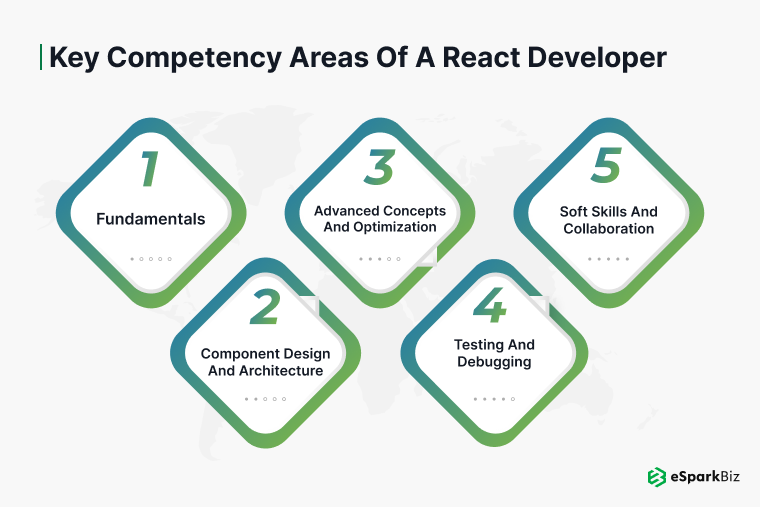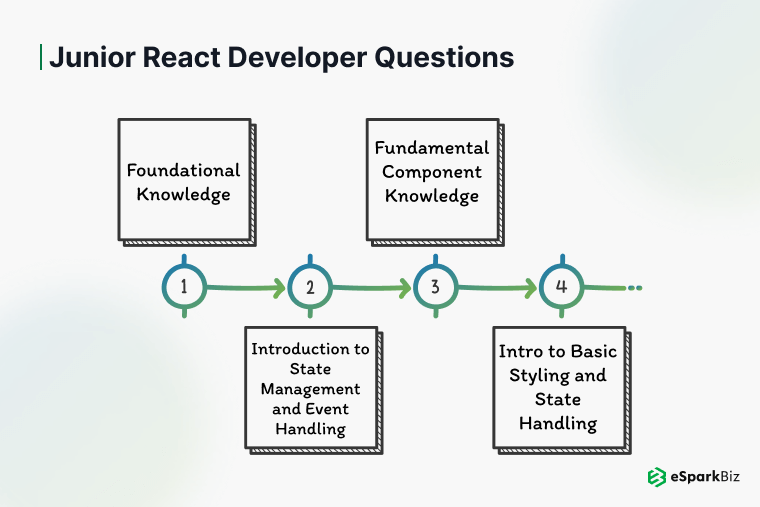Over time, ReactJS has gained wide acceptance as the most popular front-end development framework for making responsive and dynamic user interfaces. With more and more businesses employing React for their web applications and mobile applications, the need for skilled React developers will, without doubt, keep growing.
Whether Junior, Mid-Level or you need a Senior-level ReactJS, good interview questions and answers can make the difference between figuring out the right candidate’s technical expertise as well as their capabilities in solving problems and his fit into the company culture. Questions that suit the type of developer ensure an effective interview process and help you in making the best hiring decision.
Key Competency Areas of a React Developer

In these competency areas, you must check upon recruiting a React developer. Major areas include the following:
Fundamentals: Check foundation-level understanding of the ReactJS libraries.
Component Design and Architecture: Test structure and reusability of React.
Advanced Concepts and Optimization: Check state management and performance.
Testing and Debugging: Proficient with debugging tools and testing tools.
Soft Skills and Collaboration: These tests collaboration and communicative skills, which are more relevant for Mid-Level and Senior employees.
Let’s dive into the 30 Essential React Interview Questions and Answers Based on the Experience Level.
Junior React Developer Questions

Foundational Knowledge
Q1: What is React, and why would you use it?
Expected Answer: React is a popular JavaScript library for building user interfaces, with a focus on component-based structure, virtual DOM, and efficient server-side rendering.
Additional Context: Hire candidates who emphasize whether React fits into the general category of developing web applications and mobile applications through React Native. They must know the general concept of improving performance through the virtual DOM elements when opting to create React App.
Q2: What are the main differences between components, states, and props?
Expected Answer: This unit of reusability is meant for the user interface while props are meant to provide data into a component.
Additional Context: Ideal candidates must explain the core distinction between props (read-only data passed into a component) and state ( data managed internally by the component logic). They should understand their effect on rendering updates.
Q3. What is JSX, and how does JSX work in React?
Expected Answer: JSX is a transformation of the JavaScript code syntax that appears similar to HTML and makes writing and reading React code easier, ultimately also ensuring the code quality.
Additional Context: A positive sign when candidates appearing for interviews reply that JSX is translated into JavaScript function with the help of tools such as Babel.
Fundamental Component Knowledge
Q4: How would you go about writing a functional component in React?
Expected Answer: Functional components are stateless components that render JSX.
Additional Context: Hire those who know that functional components have come to rule the roost in React because of hooks, which endow them with the ability to handle stateless components and side effects.
Q5: What are the component lifecycle methods?
Expected Answer: React Lifecycle methods are a essential ReactJS feature available in class components, which handle the mounting, updating, and unmounting of the component’s phases.
Additional Context: Good candidates might mention alternate uses of ReactJS hooks, like using effects in a functional component, hence working with the life cycles of classes and functional React elements.
Introduction to State Management and Event Handling
Q6: How does it work useState, and when would you use it?
Expected Answer: UseState is a hook that enables stateful components to initialize and update function components.
Additional Context: Ask for a more concrete understanding of the useState by inquiring how they handle multiple states.
Q7: How do you handle events in React?
Expected Answer: Events are handled simply by attaching an event listener (e.g., onClick), say onClick directly inside JSX using camelCase.
Additional Context: Good applicants will also be able to show instances of most situations, such as invoking a method on button click, and thus demonstrate their familiarity with the event handler in real use cases.
React tip: avoid using useEffect() to handle events when you can you can handle them directly when the event happens.
❌ “When messages change, do something; on submit, set messages” = confusing
✅ “On submit, set messages & do something” = clear pic.twitter.com/zhbZc017yN
— David K 🎹 (@DavidKPiano) October 11, 2024
Intro to Basic Styling and State Handling
Q8: What are the most common ways in which you can style React components?
Answer Expected: You would style with CSS files and inline styles, use CSS modules, or perhaps use something like Styled Components.
Additional Context: In this answer, additionally throw in the trade-offs that come with it, like scoped styles with CSS Modules, and dynamic styling with inline styles using JavaScript as part of Styled Components.
Q9: How can data be sent from a parent component to a child component?
Expected Answer: Props provide a way for the parent can send values to the child components and seamlessly pass data.
Additional Context: Ideal candidates also express the fact that props are immutable in the child component and perhaps how they have used props in previous projects to make React components reusable more easily.
Q10: What is conditional rendering in React?
Expected Answer: Conditional rendering in React means that building reusable UI components will be shown according to certain conditions, which is most of the time applied using if statements or ternary operators in JSX.
Additional Context: Good candidates will be able to give concrete examples by hand. They can explain what they know about dealing with different user interface states.
Also Read: Comprehensive ReactJS Development Services : Shift Towards the Appealing UI
Mid-Level React Developer Questions

React Component Design and State Management
Q11: Difference between functional and class-based components?
Expected Answer: Functional are pure functions that return the JSX, while the class components use ES6 classes, lifecycle methods, and this context.
Additional Context: A good understanding of the evolution of React and knowing both types are good signs. Currently, functional hooks are better for HOC.
Q12: Define the Higher-Order Components (HOC) in React
Expected Answer: HOCs are higher-order components that take a React component in as an argument and return an enhanced version of that so that code reuse is possible across different numbers of React components.
Additional Context: An ideal candidate provides an example of applying HOC for something like authentication checks, which might well be considered a sign of knowledge about React’s advanced design patterns.
Q13: What is Context API and when do you use it?
Expected Answer: This library manages the global state and not the prop drilling because it allows any value to be passed directly into a component tree.
Additional Context: Candidates should be able to explain where a context API might be used versus Redux with ReactJS to make them aware of what limitations.
Advanced State Management with Hooks
Q14: How does use effect work?
Expected Answer: useEffect is a hook for side effects in functional components. So it can run after some render method or after two or more components’ specific dependencies have changed.
Additional context: A good candidate will point to the need for dependencies as well as to the fact that the use effect is useful, for instance, when there is a subscription.
Q15: Why is it good in React to use userRef?
Expected Answer: useRef allows a stable reference across a render method without causing a re-render. This is useful for tasks like Virtual DOM element manipulation or keeping track of values that should remain constant.
Additional Context: Candidates must know actual use cases for tracking the mounting of React components.
Performance Tuning and Ecosystem Awareness
Q16: How do you optimize the performance of a React application?
Extended Answer: Some ReactJS Performance optimization techniques are memoization, code splitting, lazy loading, and reducing extra React renders by using React.memo.
Additional Context: Perfect answers will be specific usage-based, such as using memoization with large lists or lazy loading images, to add practical experience.
Q17: What is a React memo?
Expected Answer: React. memo is a higher-order component that prevents a re-render of React components if props haven’t changed and improves functional components’ performance.
Additional Context: All the applicants should understand the application scenarios and when React. memo is likely to have a minimal influence, such as with very fluctuating props on a component.
Q18: What do you understand about routing in React?
Expected Answer: The routing function in React is taken care of by the React Router. It makes navigation within the context of a single-page application possible by associating URLs with different views.
Additional Context: A great candidate will know how to expand on nested routes, dynamic routes, and hooks such as useHistory or useParams in React Router.
Testing and Debugging
Q19: What debugging steps would you take if this React component isn’t rendering the way you expect?
Expected Answer: Check the props and state of the class component. Also, look at console errors. Use React DevTools to inspect the hierarchy of React components as well as initial state changes.
Additional Context: Other React Developer tools and techniques that candidates should have applied to particularly tricky problems. For example browser DevTools.
Q20: What testing tools and libraries are you using currently with your React applications?
Expected Answer: The most common ones in use are unit tests with Jest, pure component tests with React Testing Library, and end testing with Cypress.
Additional Context: A candidate should be able to provide working experience with all of these tools and explain how they have used them to ensure the reliability of their pure components.
Unable to find the Right ReactJS Developers for your desired project development?
Partner with eSparkBiz- The Reputed ReactJS Development Company that offers client-centric, responsive and market standard development solutions.
Senior React Developer Questions

Architectural Knowledge
Q21: Explain monolithic vs. component-based architecture.
Expected Answer: A React app is built as a whole thing in the case of monolithic architecture, and in component-based architecture, it is segmented into reusable, modular parts.
Additional Context: Experienced candidates are clear that component-based architecture in React increases reusability, scalability, and maintainability.
Q22: Design an application scalable for a React environment.
Expected Answer: Using the hierarchical structure of the multiple components, state management, and data flow support other components such as Context API or Redux.
Additional Context: Candidates would be able to additionally elaborate: on organizing lazy loading, or a library of reusable components.
Also Read: Why React JS Is A Picture Perfect Choice For Enterprise App Development?
Complex State Management
Q23: What is the difference between Redux and Context API, and when would you use each?
Expected Answer: Redux is suitable for complex state needs because it has a robust structure with middleware support. Context API is more suited for lighter global state management.
Additional Context: A way to recognize the scalability benefits of using ReactJS with Redux and the limitations of Context API, along with proper usage scenarios for both.
Q24: Explain advanced concepts like redux-saga and reselect.
Expected Answer: redux-saga with async actions helps to make side effects easy to implement using generators and reselect optimizes Redux by memoized selectors.
Additional Context: A good answer would illustrate practical examples of where to use redux-saga such as API calls and reselect for computationally expensive state calculations.
Deep Dive into Performance Optimization
Q25: You are working with a large data set in a React application. What would you do?
Expected Answer: You use pagination, infinite scroll, and data virtualization techniques for loading your data in chunks.
Additional Context: On how to make large lists work in the React world, one of which is React Virtualized, which helps you render components in large lists.
Q26: How does code-splitting work in React?
Expected Answer: Code splitting divides code into smaller bundles and lazy loading allows the component to load only when required. Both can enhance the load time as well as the user experience.
Additional Context: Hence, ideal candidates are familiar with how code splitting is performed by Webpack and React. lazy function for lazy component loading.
Testing, Monitoring, and Continuous Integration
Q27: How do you test large React applications?
Expected Answer: Use a combination of unit tests, integration tests, and end-to-end tests with CI pipeline to ensure consistency.
Additional Context: The candidate should give examples of specific test cases. The response will show that they have a comprehensive approach towards testing and know about CI/CD Development.
Q28: How will you monitor the performance of a React application in production?
Expected Answer: Tools include New Relic, Sentry, and Google Analytics. They deliver real-time error tracking, monitoring, and performance.
Additional Context: Applied-learning-type candidates would sometimes highlight very specific performance metrics that they might be tracking, such as error rates.
Mentorship and Team Collaboration
Q29: Describe a time when you mentored junior developers in React.
Expected Answer: A candidate’s example should show empathy, patience, and a structured approach to teaching, such as code reviews or pair programming.
Additional Context: Great candidates should speak about how they are making complex concepts approachable and cultivating continuous learning.
Q30: How do you ensure that coding standards and best practices are being followed by the team while coding in React?
Expected Answer: There must be style guides, regular code reviews, proper documentation, and best practices of ReactJS.
Additional Context: Candidates should know about the proven programmer tricks and talk about how they take feedback and also ensure that a team enforces consistent standards.
Conclusion
This set of 30 essential React Interview questions can help you evaluate any React developer for Junior, Mid-Level, and Senior experience levels. Since these React Interview Questions range from foundational knowledge, state management, and testing, to team collaboration, you can assess the React developer skills and cultural fit with the team. Since they are fully customizable, your React Interview questions ensure a flawless interview process.
Why Hire ReactJS Developers from eSparkBiz?
A team of experienced React developers: Hire ReactJS Developers from eSparkBiz owning expertise in building a dynamic, scalable, and high-performance application tailored to the diverse business needs of clients.
Proven track: With a portfolio full of successful projects across industries, eSparkBiz has always delivered innovative React solutions, meeting the expectations of the clients.
Flexible hiring models: Choose from flexible engagement options that fit your project requirement and budget and whether you need full-time, part-time, or project-based developers.
Quality and Security Focus. The industry leaders in the practices that are properly followed by eSparkBiz ensure rigorous quality checks and secure coding standards so that the React-based applications are robust and reliable.
Support and Maintenance after Development: eSparkBiz ensures that the support and maintenance for its React applications will ensure the up-to-date workability of the applications.
Help to Achieve Your Goals. A client-centric approach is implemented in the business policies at eSparkBiz. With the objective, they bring it to reality by offering the best solutions.
Get Started Today!
Are you ready to build your next React project? Partner with eSparkBiz and unlock the versatility of our ReactJS expertise in helping deliver amazing applications. Contact us today to request a free consultation!







